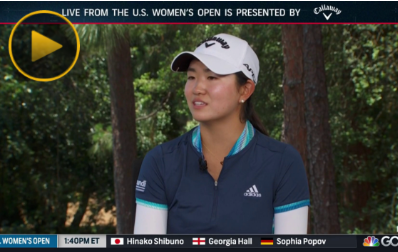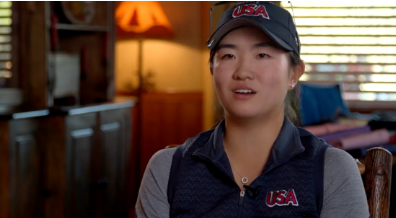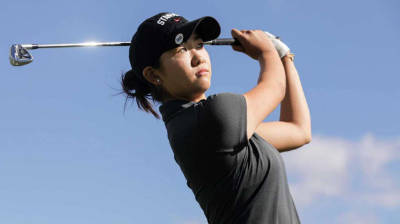BY RYAN LAVNER
APRIL 3, 2021 AT 8:13 PM
Watch the highlights: CLICK HERE
AUGUSTA, Ga. – With her tee shot duck-hooking toward the left trees on the 13th hole, Rose Zhang squinted and saw her ball drop. Where exactly, she wasn’t sure – maybe in the second cut, or in the creek, or among the azaleas. But it was there, somewhere.
“There was a white speck that I saw drop into the hazard,” she said, “but no one identified it. Not even television.”
“There wasn’t a spotter down the left side,” said her caddie, Josh Loyo. “Can you believe that?”
After a brief search and a lengthy discussion with a rules official, Zhang’s tee shot was deemed lost, sending her back to the tee and creating chaos on the leaderboard at the Augusta National Women’s Amateur.
Trailing by one heading into the final leg of Amen Corner, Zhang still had the heart of the course to play when her title chances unraveled on the reachable par 5. After her re-tee found the right side, she faced the “momentous decision” that has been eliminated for so many long-hitting men. From a sidehill lie, Zhang had 202 yards to cover the front edge of the green, 225 yards to the pin.
Augusta National Women’s Amateur: Full-field scores | Full coverage
“I wanted to lay up,” Loyo said, “but she was pretty content going after it.”
Zhang carries her 3-wood about 210 yards – with the hole playing slightly into the wind, it would have required a near-perfect strike to cover. This time, it didn’t, kicking back into the water, leading to another drop and a momentum-crushing triple-bogey 8.
“One bad shot cost us, man,” Loyo said. “That was it.”
“It was the first eventful hole I’ve had in a while,” Zhang said. “So it was not a pretty hole.”
Normally steady, with impeccable course management, Zhang couldn’t even remember her last triple bogey.
“I can’t, honestly,” she said. “It was not fun.”
The mistakes sent her crashing down the leaderboard, but a wild sequence of events over the final hour – her bounce-back birdie on 14, then a host of blunders by the leaders – gave Zhang another chance to become the second consecutive world No. 1 to capture the ANWA title. Instead, she three-putted from the back edge on 17 and misread a 12-footer on the final green, missing out on the two-person playoff, eventually won by Tsubasa Kajitani, by a stroke after a closing 75.
“My biggest takeaway is just being able to stay in the mix and really allow myself to enjoy every moment out on this golf course,” Zhang said. “Everyone playing was in contention basically, and to handle the pressure of being on TV and playing at Augusta National, I think says a lot. I have a lot to work on, and I think that if I keep in my stride, I’m still able to improve even more.”
That’s a frightening thought for the rest of the top women’s amateurs.
Less than two months from graduating high school, Zhang has won virtually everything, at every level, over the past few years. Apparently tired of trouncing the top juniors on the AJGA, she beat the defending champion to hoist the U.S. Women’s Amateur trophy last summer. A few months later, she tied for 11th at the ANA Inspiration. Despite a throbbing left wrist, she still made the cut at the U.S. Women’s Open and then, following a three-month break, lost in a playoff recently at her first Symetra Tour event. Little wonder three college golf coaches said that week that Zhang, at 17, was the best they’d ever seen at this age.
“She takes care of the controlables,” said Stanford coach Anne Walker, for whom Zhang has committed to play this fall. “She works unbelievably hard. Yeah, every kid works hard, and that’s the same at the LPGA level. But then there’s the handful that outdo those people, and she falls in that category. She’s the most prepared player in the field every time she tees it up. She doesn’t have the best outcome every week, but most times she does.”
And that’s what frustrated Zhang most on Saturday: the course-management mistakes. Her fourth shot into the 13th immediately comes to mind, but she and Loyo also miscalculated her approach on the 17th hole, opting for a 9-iron from 130 yards, even though an approach long of the flag would hit on the downslope and shoot to the back of the green.
“I do have a lot to learn,” she said. “For this event, I could have played a lot better. There were a lot of small things that I really want to work on when I get back, so hopefully I’ll just be able to take some notes and then come back even stronger.”
It’s worth nothing here that Zhang wasn’t despondent after missing the makeable birdie putt on the final green to join the playoff. In fact, once she emerged from the scoring building, she was smiling. Asked where that perspective comes from at such a young age, she said: “I just think sometimes you can’t really be too hard on yourself, especially if you are on the greatest stage of amateur golf. This is Augusta National. I think it’s our responsibility to just be excited and happy to be on this golf course and to be able to be in contention.”
How she performed this week – she was tied for the lead heading into the final round, shot 75 and shared third – will do little to silence the questions about whether she’s ready to turn professional. She was the class of an ANWA field that brought together the top amateurs in the world. She’s arguably the best American junior of the past decade, if not longer.
“I have a lot of maturing to do (first),” she said. “I just think that college is the place where I’ll be able to play even better, shoot better scores and mature as a person and player.
“For now, I don’t really have any intention of turning professional. But when I’m ready, I think I will know it.”
Walker first saw Zhang play at the 2016 AJGA Polo Junior, when she was just 13. It took all of one shot for Walker to be hooked. “It was like, OK, she’s good. I think I’ll watch her the rest of the week,” she said, laughing. “She’s been on a very consistent, upward trajectory ever since. She hasn’t hit any speed bumps.”
Walker wasn’t concerned about Zhang joining the play-for-pay ranks too early, either. Whether it’s Annika Sorenstam or Tiger Woods or Dustin Johnson, all of the greats of the past quarter-century understood the value of – and the need for – dominating their current competition, then moving on.
“They were comfortable enough in their own shoes to know that they’re going to play it for life, so they continued to learn,” Walker said. “I can see Rose being a lifelong learner.”
Especially after such a valuable experience at the ANWA.
“It’s Rose,” said Loyo, her caddie. “She’ll come back next time and be in contention again.”
























